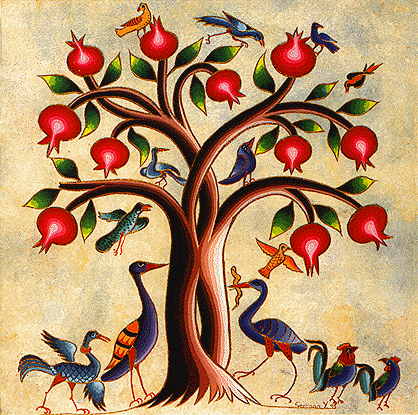Native to the landmass from Iran to the Himalayas in Northern India, this newly popular fruit was cultivated and naturalized around the world due to its excellent health properties. Pomegranate has earned its popularity because it is believed to help support the body’s natural defences against Alzheimer’s disease, various cancers, coronary and heart disease, arthritis and many age-related ailments.
 |
| Pomegranate is the second leading fruit in anti-oxidants, after Goji berries. Find out more about the Goji berry in next month's "Ingredient of the Month". |
Products:
- Pomegranate fruit (which you can buy at selected groceries),
- Booster Juice’s Pomegranate Passion (add a Warrior Boost and Women Boost to really add energy and calcium to this choice),
- The Republic of Tea’s Pomegranate-Vanilla Red Tea (which you can find for a hefty price at Chapter’s)(this tea in particular is a caffeine free Super-Tea Cocktail of anti-oxidants),
- English Tea Shop’s Pomegranate Tea (which you can find at some Winners),
- Pomegranate-Blueberry Tea (which you can find almost anywhere).
----
“The Pomegranate was often used as a herbal remedy to lengthen life and restore vigor, these qualities often made it a symbolic link between the living and the dead.
To the Romans, the pomegranate signified marriage, and brides decked themselves in pomegranate wreaths.
Pomegranate seeds appear in the famous Greek myth of Demeter, goddess of the harvest, and her daughter, Persephone...
"One day, Persephone was picking flowers in a field, when Hades, the King of the Underworld, seized her and carried her to his dark underworld to be his wife. Grief-stricken, her mother, Demeter, killed every living plant on earth and refused to let new crops grow. To prevent man-kind from starving, Zeus ordered Hades to release Persephone. However, before she was released, Hades tricked her into eating seven pomegranate seeds, "The Fruit of the Underworld", this condemned her to life in the underworld for four months out of every year. For those months (winter), the world is plunged into a dark cold emptiness, but when Persephone returns to her mother each year, the earth again begets flowers, fruit, and grains."
"A single fruit grew on that tree, a bright pomegranate fruit. Persephone stood up in the chariot and plucked the fruit from the tree. Then did "he" prevail upon her to divide the fruit, and, having divided it, Persephone ate seven of the pomegranate seeds." - The Golden Fleece by Padraic Colum (1881-1972).
In Greek myth, Orion's wife was very beautiful, even rivaling the beauty of Zeus's wife, Hera. For her daring to compete with Hera, her children were killed and she was persuaded to believe herself the culprit. In agony, she threw herself from a cliff. The location of her blood was where the first pomegranate tree grew.
In the modern-day traditions of many Greeks, it is customary to adorn the holiday table with pomegranates. The Greeks consider the pomegranate to be a symbol of abundance; a fruit that spills over in plenitude and good luck. They are set out in honor of the fertile land and its bounty. Pomegranates also make an appearance during weddings, funerals, and New Year celebrations.
Pomegranates in China are associated with fertility. One of these fruits, shown half-opened, is often a wedding gift, it means a hundred seeds, or more completely, a hundred sons. The word for seed and sons in Chinese is "zi", it is also the word for "sons."
Religious Symbolism
To the early Jews, pomegranate seeds were an affirmation of their faith. Each pomegranate was believed to contain exactly 613 seeds, a number that corresponds with the number of commandments in the Torah. This belief was once so strong that the Old Testament calls for the pomegranate's image to be woven into priestly robes. The pomegranate may also be the original fruit from the Garden of Eden, making it the representation of all that is forbidden. One taste of its ripe seeds and all knowledge of death, sex, and sin are suddenly clear. However, this didn't stop early Christians from idolizing the fruit. Christian art, often depicts the Virgin Mary with a pomegranate, either in her hand, or nearby. This was to symbolized the Virgin Mary's power over life and death, as well as the seed that bore the Son of God.
Ancient Arab women used pomegranate seeds to predict their own fertility. The pomegranate was dropped on the ground, in the center of a circle. When it broke open, the number of seeds that landed outside the circle, was the number of children she would have.” – Squidoo.com
Pomegranate is also a sign of fertility to the Chinese, and makes a great wedding gift.













No comments:
Post a Comment